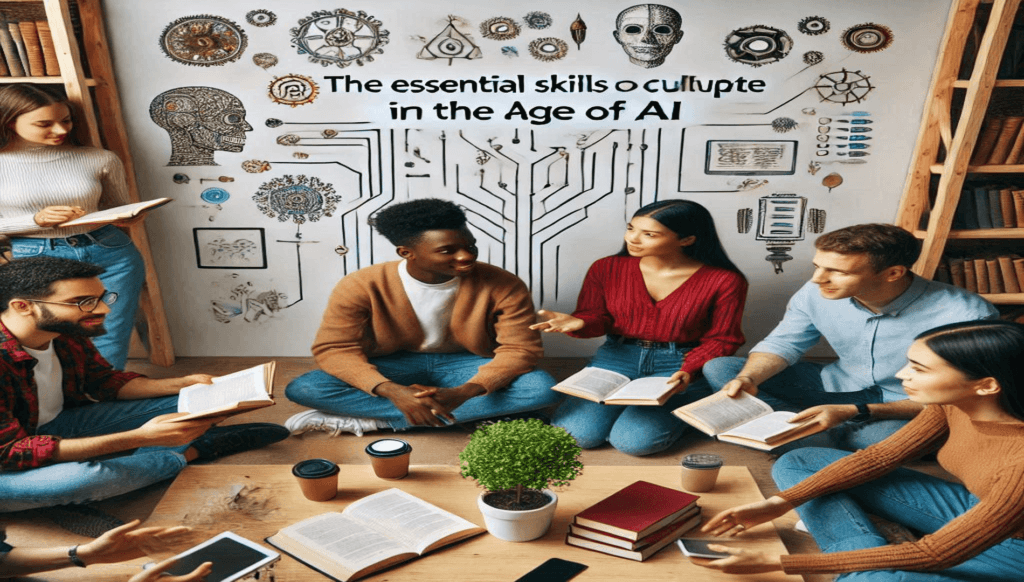
Artificial intelligence (AI) is not just a buzzword anymore—it’s reshaping industries, redefining job roles, and influencing how we work and learn. As AI technologies become increasingly sophisticated, they’re automating repetitive tasks and creating new opportunities that require us to rethink the skills we bring to the table. To thrive in this AI-driven world, adapting, learning, and cultivating specific capabilities is imperative. In this article, we’ll explore the essential skills to cultivate in the age of AI and why they’re critical for success.
Why Focus on Skills to Cultivate in the Age of AI?
AI’s influence is pervasive—from streamlining business operations to personalizing consumer experiences. However, as automation takes over routine tasks, the demand for uniquely human skills has skyrocketed. I believe that the skills to cultivate in the age of AI go beyond technical expertise. They encompass soft skills, adaptability, and lifelong learning, which are essential to navigating this ever-evolving landscape.
But here’s the kicker: it’s not AI itself that will replace jobs; it’s the lack of skills that will make individuals obsolete. With predictions like 42% of business tasks being automated by 2027, it’s high time we double down on the skills that matter.
The Most Important Skills to Cultivate in the Age of AI
Mastering skills in the age of AI is crucial, and understanding the skills needed in the age of AI will ensure you stay ahead in this rapidly evolving landscape.
1. Adaptability and Learnability
The ability to pivot and learn new things quickly is no longer optional. In a world where AI technologies evolve at breakneck speed, being adaptable ensures you can keep pace with change. Learnability—the drive and ability to acquire new skills—is a cornerstone of success.
How to Cultivate This Skill:
- Stay curious and open-minded.
- Embrace new challenges as learning opportunities.
- Enroll in courses or workshops on emerging AI tools and methodologies.
2. Critical Thinking and Judgment
AI systems excel at data analysis but cannot often interpret nuanced or complex scenarios. That’s where human judgment comes in. Critical thinking allows us to evaluate AI outputs, identify biases, and make informed decisions.
Practical Tips:
- Question assumptions and explore multiple perspectives.
- Practice analyzing complex problems in your industry.
- Develop your ability to assess AI-generated data critically.
3. Communication and Collaboration
Despite AI’s capabilities, effective communication and teamwork remain irreplaceable. AI might assist in generating ideas or managing tasks, but it’s humans who bring the emotional intelligence needed for collaboration.
Boost Your Communication Skills:
- Hone your ability to convey ideas clearly and persuasively.
- Foster open communication in team settings.
- Use AI tools to enhance, not replace, interpersonal interactions.
4. Cultural Awareness and Sensitivity
In an interconnected world, where AI creates and interacts across cultures, understanding diverse perspectives is invaluable. This skill is especially crucial for content creation and global collaboration.
Steps to Build This Skill:
- Engage with people from different cultural backgrounds.
- Learn about cultural norms and practices worldwide.
- Leverage AI tools to tailor communication for multicultural audiences.
5. Emotional Intelligence (EQ)
AI might simulate empathy, but genuine emotional intelligence—the ability to understand and manage your emotions and those of others—is uniquely human. EQ enhances leadership, teamwork, and customer relationships.
How to Develop EQ:
- Practice active listening and empathy.
- Reflect on your emotional responses and adjust accordingly.
- Seek feedback to understand how others perceive you.
6. Metacognition
Thinking about how we think—or metacognition—is a meta-skill that helps refine other capabilities. In the AI age, this means reflecting on how we use AI tools and improve our learning processes.
Cultivate Metacognition:
- Set aside time to evaluate your thinking patterns.
- Use journaling to track your progress and self-awareness.
- Engage in discussions that challenge your viewpoints.
7. Technical and AI-Specific Skills
While soft skills are essential, understanding the basics of AI is equally critical. Familiarity with AI tools and their applications can set you apart in the job market.
Key Areas to Focus On:
- Learn programming languages like Python or R.
- Understand machine learning basics.
- Explore AI tools relevant to your industry, such as chatbots or data analytics platforms.
Lifelong Learning: A Non-Negotiable Skill
The concept of lifelong learning has taken on new urgency. Formal education alone is insufficient to keep up with the rapid pace of technological advancements. I’m convinced that lifelong learning is the backbone of success in the AI age.
Strategies for Lifelong Learning:
- Use platforms like Coursera or Udemy to stay updated.
- Participate in industry webinars and conferences.
- Align learning goals with your career aspirations.
Trust in AI: Building Confidence in New Technologies
Trust is an underrated but essential skill in leveraging AI effectively. Whether you’re an employee or a leader, trusting AI systems requires a solid understanding of their limitations and capabilities.
How to Build Trust:
- Educate yourself about AI’s potential and pitfalls.
- Advocate for transparency and ethical AI practices in your organization.
- Participate in discussions around AI governance and bias.
AI and Education: A Partnership for the Future
Education systems must evolve to keep pace with AI’s growth. Personalized learning, facilitated by AI, is revolutionizing how we acquire knowledge. In my opinion, integrating AI into education can bridge skill gaps effectively.
Role of AI in Learning:
- AI as a tutor: Personalized feedback and guidance.
- Adaptive learning systems: Tailoring education to individual needs.
- Enhancing critical thinking: Teaching students to question and analyze AI outputs.
Practical Steps to Future-Proof Your Career
- Assess Your Skills: Identify your strengths and areas for improvement, especially in soft skills and technical knowledge.
- Upskill Continuously: Seek out resources, courses, and mentorship opportunities.
- Embrace Change: Stay flexible and ready to pivot in response to AI-driven transformations.
- Build Networks: Connect with professionals in your field to exchange insights and opportunities.
- Explore Unmet Needs: Target roles and industries where AI can complement, not replace human capabilities.
Embrace the Skills to Cultivate in the Age of AI
The age of AI is here, transforming the job market and workplace dynamics in unprecedented ways. By cultivating adaptability, emotional intelligence, critical thinking, and technical skills, we can harness AI as a tool for growth rather than viewing it as a threat. Investing in human skills in the age of AI, including crucial soft skills, is essential for staying competitive. Soft skills in the age of AI, such as communication and empathy, are more important than ever. They bridge the gap between human and machine interactions, emphasizing why soft skills are crucial in the age of AI.
Leadership skills in the age of AI are also paramount. They drive innovation and guide teams through the complexities of integrating AI into daily operations. The future of skills in the age of AI hinges on our ability to blend human ingenuity with technological advancements.
I urge you to take proactive steps today to secure your place in tomorrow’s world. Are you ready to embrace these human skills in the age of AI and future-proof your career? Let’s make AI work for us, not against us.
Sources of Insight:
- World Economic Forum. (2024, October 17). Skills in the Age of AI [Live Stream]. World Economic Forum.
- World Economic Forum. (2024, December). Lessons Learned from AI: Skilling Workers for the Future.

Ajay Dhage is a seasoned talent acquisition leader with over 20 years of experience in Talent Acquisition and Workforce Strategy across the oil and gas, EPC, and renewables sectors. As Talent Acquisition Lead for a global Oil & Gas EPC company in India, he manages the end-to-end hiring lifecycle for complex, multi-disciplinary projects, from sourcing and assessment to onboarding and workforce planning. Known for his customer-focused approach and innovative use of AI and data in hiring, Ajay focuses on building future-ready workforces and resilient leadership pipelines. Through ajayable.com, he shares insights, trends, and practical frameworks to help HR professionals, organisations, and recruiters excel in a rapidly evolving, competitive talent landscape.
Leave a Reply